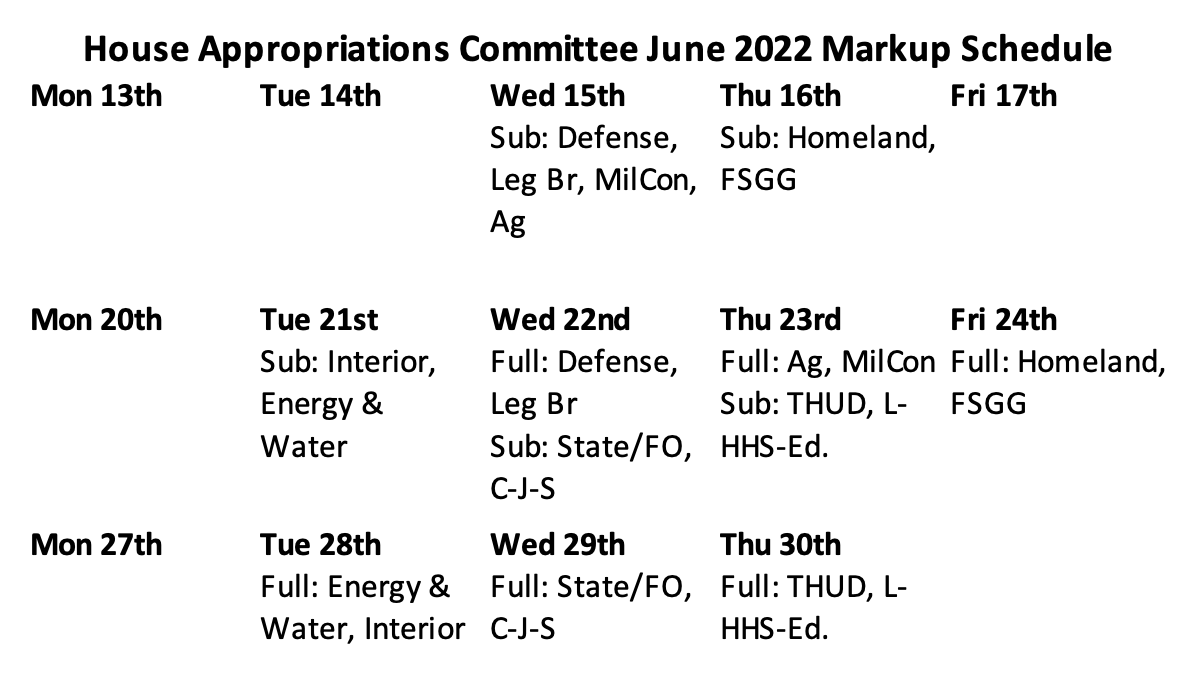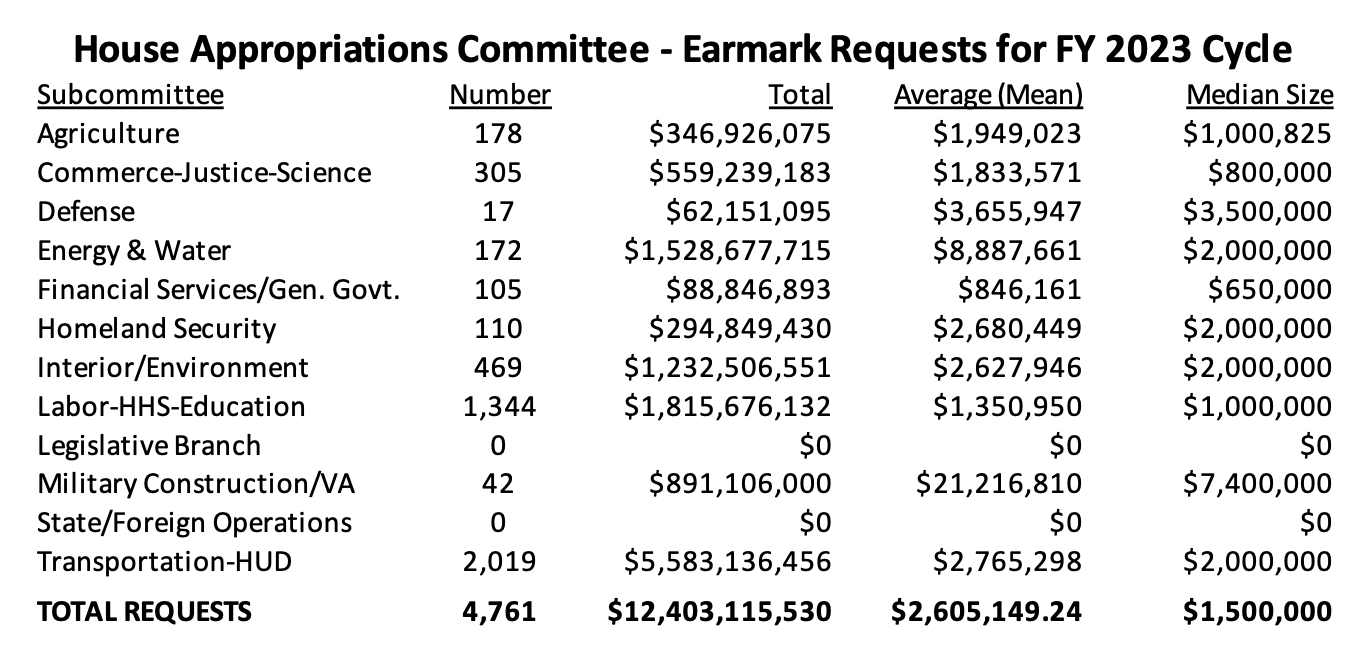The annual appropriations process for fiscal year 2023 started in the House of Representatives this week when the House on June 8 adopted a resolution (H. Res. 1121) giving the House Appropriations Committee an overall spending total for the year. In conjunction with this, Appropriations announced a schedule for considering all of the annual spending bills in committee by the end of this month.
Spending total
H. Res. 1121, which was adopted by a party-line vote as part of a larger procedural vote on the gun control bill, gives the Appropriations Committee a “base” total spending ceiling of $1,602,901,000,000. As to what that number really means, we’re not quite sure. The Congressional Budget Office has not yet released its re-scoring of President Biden’s fiscal 2023 budget request (next month, we are told).
The President’s requested discretionary total, after correction for their bewildering refusal to acknowledge the Shelby-DeFazio Harbor Maintenance Trust Fund spending exclusion and rejecting a proposed move to transfer some Indian funding to the mandatory side of the budget, was scored by the Office of Management and Budget as being $1,580.3 billion, which would be a $109.4 billion increase over the CBO-scored fiscal 2022 equivalent. But that is a net total, and the request also includes $35.1 billion in offsetting CHanges in Mandatory Programs, or CHIMPs, most of which are regarded as budget gimmicks. This was more than double the $14.3 billion in CHIMPs in the fiscal 2022 omnibus.
If the House simply holds the total amount of CHIMPs to last year’s level, that would mean that the $1,602.9 billion in H. Res. 1121 is the equivalent of $1,617.3 billion on a gross basis, which is just $2 billion off from the OMB score of the President’s gross total. So it is safe to say that the House-adopted total is, at least, very close to the President’s request and may be the President’s exact request, if the CHIMP level is a little above last year.
|
|
|
If You Hold |
|
CBO Score |
OMB Score |
CHIMPs to the |
|
FY22 Omni |
FY23 Request |
the FY22 Level |
| Base Gross |
1,485,246 |
1,615,335 |
1,617,299 |
| CHIMPs |
-14,398 |
-35,068 |
-14,398 |
| Base Net |
1,470,848 |
1,580,267 |
1,602,901 |
Then, beyond that, H. Res. 1121 sets up a system of adjustments and exclusions to that base total that add up to an additional $28.5 billion in non-defense appropriations on top of that base total. The Disaster Relief total is taken from page 124 of the Analytical Perspectives volume of the FY23 Budget, and the rest is taken from H. Res. 1121 or other relevant budget documents.
|
FY 2022 |
FY 2023 |
FY 2023 |
|
Omnibus |
Request |
House |
|
(CBO) |
(OMB) |
(CBO) |
| Base Gross |
1,485.2 |
1,615.3 |
1,617.3 |
| Offsetting CHIMPs |
-14.4 |
-35.3 |
-14.4 |
| Base Net |
1,470.8 |
1,580.3 |
1,602.9 |
|
|
|
|
| Adjustments to Base: |
|
|
|
| Disaster Relief |
18.9 |
19.9 |
20.1 |
| Program Integrity |
2.1 |
2.3 |
2.3 |
| Wildfire Suppression |
2.5 |
2.6 |
2.6 |
|
|
|
|
| Exclusions from Base: |
|
|
|
| 21st Century CURES |
0.5 |
1.1 |
1.1 |
| Harbor Maintenance |
2.1 |
1.7 |
2.4 |
|
|
|
|
| TOTAL DISCRETIONARY |
1,497.0 |
1,607.9 |
1,631.4 |
House markup schedule
Yesterday, the House Appropriations Committee released an ambitious schedule for anticipated subcommittee and full committee markups of the twelve general appropriations bills for fiscal 2023, with the Transportation-HUD and Labor-HHS-Education bills bringing up the rear:

Committee rules state that draft bill text has to be released online 24 hours in advance of a subcommittee markup, and draft report text has to be released online 24 hours before the full committee markup. This means that the account-level spending totals for the Department of Transportation will be released at 4 p.m. Wednesday, June 22.which is 24 hours ahead of the scheduled subcommittee markup. Then, the more detailed spending instructions in the report will be released at 10 a.m. on Wednesday the 29th, 24 hours before the full committee markup.
Earmark request totals
Why are the THUD and Labor-H bills bringing up the rear? It may have something to do with the volume of earmark requests received. The Appropriations Committee has received a total of 4,761 earmark requests for this cycle, and 3,363 of them (71 percent) are in one of those two final subcommittees. Transportation-HUD in particular got 2,019 requests totaling $5.6 billion.

Setting aside the other relative merits and demerits of the earmarking process, it takes a lot of staff time, which may be why Labor-HHS and Transportation-HUD get to go last, and the subcommittees with the fewest earmark requests get to go first.
(In the final FY 2022 Transportation-HUD funding law, $2.85 billion was earmarked, $1.334 billion at DOT and $1.516 billion at HUD.) The full list of all 4,761 requests can be downloaded here.
Floor action
We’re still not sure how and when the Transportation-HUD bill will come to the House floor, only that the Majority Leader intends to have all 12 bills passed by the House before the targeted July 29 adjournment date for the scheduled five-week August recess.
Since 2020, Democrats have used COVID protocols (which have limited how many members can be in the House chamber at any one time and thus limits how many rapid roll call votes can be held per day) as a justification for drastically truncating the traditional consideration of appropriations bills and floor amendments. Even as the COVID protocols have been slowly withdrawn, the limitations on amendment votes have continued, to the point that it’s probably more about the Democrats having such a narrow majority and not wanting to take tough votes, instead of being about COVID exposure.
In FY 2022, the Transportation-HUD bill was bundled together with six other bills (Labor-HHS-Education, Agriculture, Energy and Water, Financial Services, Interior/Environment, and Military Construction/Veterans) for House floor consideration. The year before that, it was bundled with a slightly different alignment of six other bills (Defense, Commerce-Justice-Science, Eenrgy and Water, Financial Services, Homeland Security, Labor-HHS-Education). The year before that, it was a comparatively petite four-bill package (Commerce-Justice-Science, Agriculture, Interior/Environment, and THUD).
For the last two years, almost all amendments for a package of spending bills were grouped into three indivisible en bloc packages: all the Democratic-only amendments, which would pass, all the Republican-only amendments, which were guaranteed to fail because there is no way to separate the crazy amendments from the sane amendments, and a group of cherry-picked bipartisan amendments, which would also pass.





